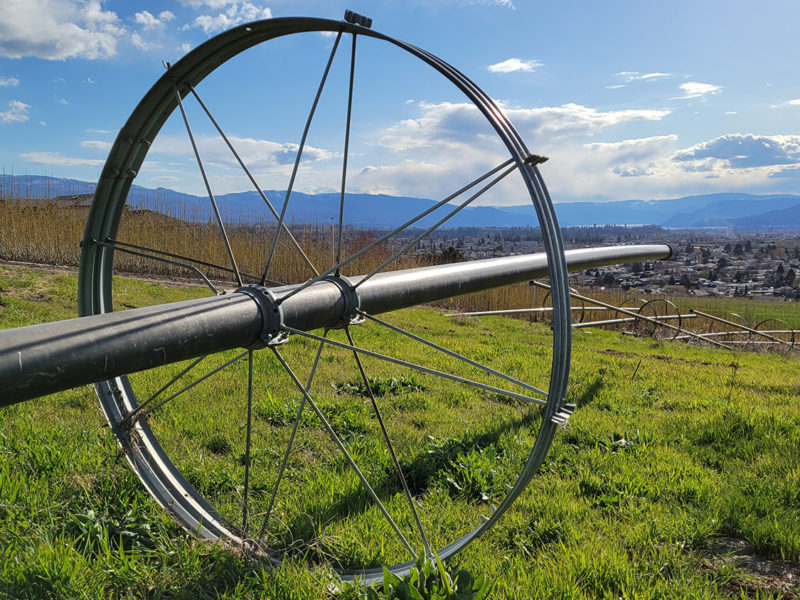DUNCAN – BC signed an historic watershed planning agreement with the Cowichan Tribes last May that set the stage for the province’s first water sustainability plan, but local farmers say the pressures on the region’s farms can’t wait.
Beginning in the mountains southwest of Duncan and flowing 44 km northeast towards the city, the Koksilah River eventually joins the Cowichan River just before it empties into Cowichan Bay. According to a 2020 study, 30% of land use and 65% of water use within the watershed is for agriculture.
But agricultural water users have been cut off three times in the past five years when late summer flows in the Koksilah dropped to levels the province said endangered fish populations.
“It has resulted in a major crop loss for us,” says Duncan dairy farmer Ben Vanden Dungen.
Vanden Dungen and other local farmers banded together in 2020 to develop an irrigation schedule that aimed to limit their impact on the river, and with the new planning process he was invited to join the collaborative community advisory table (CCAT) that will advise on the Koksilah plan’s development.
But the province says the plan’s development will take three years, a long time for farmers who are running out of water today.
“I appreciate that these things take time, but three years for a business of our size could be hugely detrimental,” he says. “While we are setting things up for the future, we need to figure out ways to support the people who need it now.”
The table’s initial meeting took place November 6. Vanden Dungen is optimistic that it will make a difference, but remains concerned about the near-term, given the failure to implement past studies and plans.
“Why aren’t we doing things now when we have this research and examples from other streams as well?” he asks.
Katy Ehrlich of Alderlea Farms, which was hit with fines last summer after the province couldn’t find a record of its groundwater licence application, shares Vanden Dungen’s concerns given the entrenched attitudes among provincial staff.
Alderlea is fighting a cease-use order issued against its water use, and Ehrlich is worried about what this summer will bring for other growers if the province continues to shut down users in a watershed that a lack of provincial regulation allowed to become over-allocated in the first place.
“I really have hope that WLRS is in the process of developing an interim policy and hitting a reset on the licences,” she says, referring to the BC Ministry of Water, Land and Resource Stewardship handed responsibility for water management in November after years of being part of Forests.
Solutions may be forthcoming, according to the BC Cattlemen’s Association.
“We have been told by inside sources that Premier Eby has told his staff that he does not want any curtailments in 2024,” says BC Cattlemen’s vice-president Werner Stump. “How that plays out, we are not sure.”
Streamflows are not a new issue in the province. Reports stretching back to the 1970s show concern with the need to manage water levels in streams across the province for the good of society and wildlife.
“Just like the wildfire hazard situation, streamflows are problem that has been building for years,” says Stump.
But the province’s pledge to “co-manage the watersheds in BC” with First Nations, leaving only a marginal role for the agriculture industry, means agriculture isn’t likely to have much direct input into the planning process despite “Indigenous and local food security” being one objective.
Moreover, agriculture accounts for about half the province’s water demand and has been the industry most impacted by fish protection orders. A government estimate based on 2019 data of a 60-day curtailment order for users in the Koksilah watershed pegged crop losses at $500,000.
Angela Boss, the BC Ministry of Agriculture and Food’s representative to the Koksilah planning process, said farmers were invited to sit at the community advisory table. Seven of the table’s 19 members are farmers, representing the dairy, horticulture and winery sectors.
“That table helps to assist with the planning process. At least seven of them identify as farmers out of the 19, which is a pretty substantial number of folks,” Boss claims. “They will be working alongside of the planning table to review the recommendations, the pieces that come forward in the plan.”
However, government documents indicate that the advisory tables have no role in actually developing water sustainability plans. Instead, the planning team comprises members from the province, the Cowichan Tribes as well as the Cowichan Watershed Board, working under an executive director.
“This is a government-to-government process,” Boss confirms.
Even so, there is no representation from the federal Department of Fisheries and Oceans, despite the fact that provincial curtailment orders were issued to protect spawning chum salmon, Coho and steelhead.
“No one in the room identified as being from DFO,” Boss says of the November 6 meeting, which was closed to media.
DFO’s absence doesn’t make any sense to BC Cattlemen’s general manager Kevin Boon.
“When I met with federal agriculture minister MacAulay [in October], I made it clear to him that the fish protection orders that the province invokes are at the insistence of the federal government and that the federal government must get involved in planning to support the fish,” Boon says.


 Country Life in BC writer recognized
Country Life in BC writer recognized